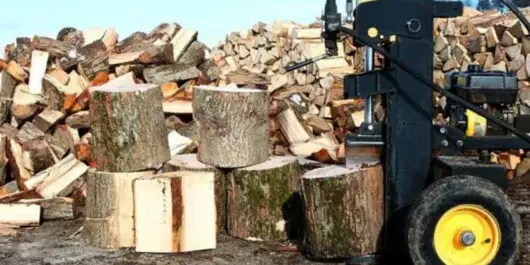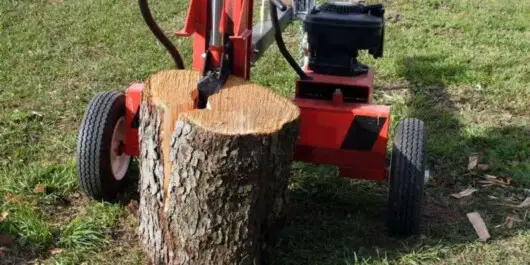Do you own a log splitter but find it moving slowly after a few log splitting sessions? If yes, then you’ll find out why it is happening and how to fix it here.
Log splitter moving slow is a common issue faced by the majority of homeowners. A slow log splitter is usually caused by issues with the power supply, pump or cylinder, hydraulics, ram, or fan. When you notice your log splitter isn’t functioning like it is supposed to, you shouldn’t procrastinate fixing it at a later date. Instead, you should resolve the niggling issues right away so that they don’t become a major problem later on.
In this article, you’ll get to know all about your log splitter moving slowly, why is my log splitter moving slow, fixes for why is my wood splitter so slow, how to speed up your log splitter, and more. Continue reading to get all the answers that you’re looking for.
Why is my log splitter moving slow?
It’s a cold winter’s night, you get in after a long day’s work and all that you want is a log fire. However, you’ve burnt through all the firewood, and you have to start chopping off some wood. Unfortunately, you had been ignoring the slow speed of your log splitter, and now it is running at a snail’s pace. You’ll be left to wonder why is my wood splitter so slow.
A log splitter often gets slowed down by issues with the power supply, hydraulics, fan, ram, pump, or cylinder. You should check each element one by one, as it’ll help you identify the root cause of the problem. The speed of the log splitter cycle usually ranges between 3-5 seconds up to 30 seconds, depending upon the type and age of the log splitter.
One of the first things that you’ll need to consider is what type of log splitter you’re using. Is it a petrol log splitter or an electric log splitter? If your log splitter isn’t starting or won’t stay running, maintenance could fix this. Make sure that your engine has got the right amount of engine oil and gas, while ensuring that you don’t over or underfill it. Similarly, if your log splitter spends a lot of time in storage, make sure that you drain it of fluids. If fluids get left in for long periods of time, they could damage the inner workings of your log splitter. Moreover, continue to check your spark plug and clean/change the air filter.
If you’re using an electric log splitter, check the power source. This is often the root of the issue, whether it’s a blown fuse or a slight clink in the cable. Likewise, once you’ve eliminated that, check the extension cable. Make sure that the extension cable is up to the job and unwound for optimal performance.
What are the potential causes of log splitter moving slow?
1. Power supply
Take enough time to check your log splitter’s power supply. If you’re using a gas or petrol-powered log splitter, ensure there is a sufficient amount of oil and gas. As for electric splitters, you may as well check the fuses and cables. Most of the time, faulty wires and cables are the primary reason for the log splitter slowing down. Blown fuses could be another one of the reasons why the power supply isn’t functioning properly. For hydraulic splitters, ensure that they are greased up properly.
2. Hydraulics
Issues regarding hydraulics are pretty easy to find. If you spot an issue in your log splitter, you should just get a hold of the manufacturer and have them assist you further. Moreover, you can also check for jams, bends, leaks, or more in the hydraulics system of your log splitter. If you intend to store your log splitter for a long time, ensure that you’re draining the fluids properly to prevent any jams or leaks.
3. Ram
You should keep in mind that the ram of your log splitter is considered to be the most sensitive key component of the machine. Something as thin as a hair or splinter could cause issues later on. You may as well observe that the ram is properly greased up to avoid the build-up of residue and sap. Lastly, another potential reason that your log splitter slows down is the bent ram of your log splitter. If this happens, you should contact your log splitter manufacturer and have them assist you further.

4. Fan
It’s pretty simple, the fan of your log splitter needs to be spinning freely and cleanly at all times. Take enough time to clean the fan to remove residues and debris that could have potentially caused a blockage.
5. Pump
How to know if your log splitter’s pump has gone bad? One way of knowing this is when it lacks ample pressure when the gauge is in the output line. You might be thinking about how to increase the pressure. You should just start your engine the normal way and move the lever to neutral. After that, you should adjust the screw on the side of the pump for increasing the pressure output of your splitter.
How to speed up your log splitter?
There are multiple ways you can speed up your log splitter, given that there are multiple components you can upgrade. One common upgrade that log splitter owners make is replacing the hydraulic pump with a new one. This helps in improving the fluid flow while speeding up the machine. However, you should know that there are times when a pump upgrade may require a new engine for supporting it. Hence, this could make the upgrade slightly expensive.
If you’re using a petrol-powered log splitter, the first thing that you should consider is what power your log splitter is running on. If it’s petrol, it’ll require maintenance to run fast. In most cases, when the splitter is running slow, simple maintenance could fix it. Always ensure that the log splitter engine has the right amount of gas/petrol. However, neither of them should be too high or too low. If you’re not a regular log splitter user and your machine spends most of its time in storage, then you shouldn’t forget to drain its storage units. Oftentimes, when the log splitter has petrol left inside, it awakens the log splitter internally. Moreover, you should regularly change the spark plug while also changing the air filter.

If your log splitter is running on electricity, then it can be fixed and made quicker too. For diagnosing the issue, you should check the power sources. In most cases, the reason your log splitter was running slow would be a Clint in a cable or blown fuse. If you don’t come across any issues, you should check the extension cable as it could be a reason. Make sure that the cable isn’t wounded and performing to its optimum levels.
After checking the mentioned parts above, it’ll be time to check the manual hydraulic splitters. You should check the pedal and the rod jams. In case there are any jams, you should just oil them, and it’ll run at a good speed like before. If there are any issues with hydraulics, they are quite easy to locate. Once you’ve pinpointed the issue, get in touch with your manufacturer, who will assist you further.
Conclusion
Thank you for reading. Hopefully, now you know a lot more about your log splitter moving slowly, why is my log splitter moving slow, fixes for why is my wood splitter so slow, how to speed up your log splitter, and more. Log splitter moving slowly is a common issue faced by the majority of homeowners. A slow log splitter is usually caused by issues with the power supply, pump or cylinder, hydraulics, ram, or fan. When you notice your log splitter isn’t functioning like it is supposed to, you shouldn’t procrastinate fixing it at a later date. Instead, you should resolve the niggling issues right away so that they don’t become a major problem later on.


